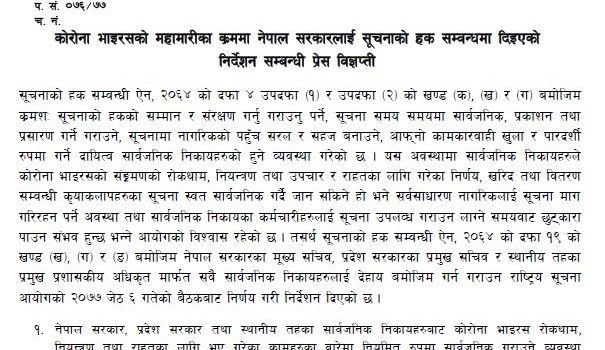In the wake of the growing menace of COVID-19 in Nepal, the National Information Commission (NIC) has issued a directive, urging the governments of all three layers and the public agencies to adopt transparency on every activity conducted around the prevention, control and treatment of COVID-19.
Freedom Forum welcomes the directive as it has stressed on building informed people and transparent public agencies and society in the crisis, which is a huge concern for all. FF has also translated the directive from Nepali to English, which is as follows:
In accordance with Section 4 (Sub-section 1 and Sub-section 2 (a) (b) and (c)) of the Right to Information Act, which states- respect and protect right to information, publicize information from time to time and ensure citizen’s access to information, the public institutions should be open and transparent. Therefore, whether it is to control Coronavirus infection, treatment and the distribution of relief materials, information about these with related decision, procurement and distribution should be made public. It would also be helpful to the government employees to save time on public disclosure of information. However, according to Section 19 (a) (b) and (c) of RTI Act, 2064 (2007): this directive made by NIC meeting held on Jestha 6, 2077 (May 19 2020) should be implemented via Nepal Government’s Chief Secretary, Province Government’s Chief Secretary and local level Administrative Officers.
- Nepal government, Province Government and Local Level Government should make public the information about the activities which are intended to control the crisis of Coronavirus and the relief materials.
- System be made transparent on the procurement of equipment, health materials, services and medicines by the Nepal government, Province Government, Local Government and health related institutions.
- Publicise information on the citizens who are hospitalized at the health facility/institution constructed by government and non-government organizations.
- System be made to publicize the information about the distribution of relief materials during lockdown by Nepal government, province government and local levels. For easy access, ensure electronic record.
- Inform both vendor and citizens about the place, time and rules on buying and selling of essentials materials.
- If a separate program is brought for the people including Madhesi, Tharu, Muslim, oppressed classes, backward classes, minorities, marginalized, farmers, workers, youth, children, senior citizens, gender and sexual minorities, persons with disabilities, pregnant women, disabled or helpless, backward classes and economically disadvantaged Khas Aryans, information about such programs should be made public.
- The details of the relief funds established by the Government of Nepal, the Province and the local levels are being made public. Therefore, clear procedures and guidelines for the operation of such funds should be prepared and the details of deposits and expenditures be made public timely and compulsorily.
- Make arrangements to contact the Information Officer of Government of Nepal, Province Governments and Local Levels and related bodies through email, viber, mobile and other means at this time.
- When it is being decided to adopt relaxation in the lockdown, or even if the lockdown is lifted, it is not possible to fully open until a drug or vaccine of corona virus is available. Therefore, all types of local media should be used to make people aware on do’s and don’ts to prevent themselves from the Coronavirus.
- Give proper information about travel to the citizens who wish to return Nepal.
- Bring in function the agencies constituted under the Monitoring Guideline on Right to Information Implementation, 2076 such as the Central Coordination Unit, Implementation Monitoring Unit, Province who will be responsible to regularly monitor the exercise of the right to information and make its report public and also make arrangements to report to National Information Commission as well.
- Make necessary arrangements to ensure health of the mass media workers and RTI activists who need to regularly visit public bodies to collect the information and disseminate it to the general public.
- In the course of disseminating the information, public bodies may provide personal information which may have tragic consequences in the future; therefore, sharing personal health and sensitive information prohibited by Article 28 of the Right to Information Act, 2064 should not be shared.
- If there is any misunderstanding about the management of the dead bodies (caused by the Coronavirus), such misunderstanding needs to cleared and clarified. Also, the information related to the preparations made regarding its management should be made public in a way that the general public can understand.
- Make maximum use of local language and media to disseminate relevant information about the precautionary measures against the COVID-19.
- Make arrangements for each public body to include the aforementioned information in their publications every three months as required by the law.
——–

